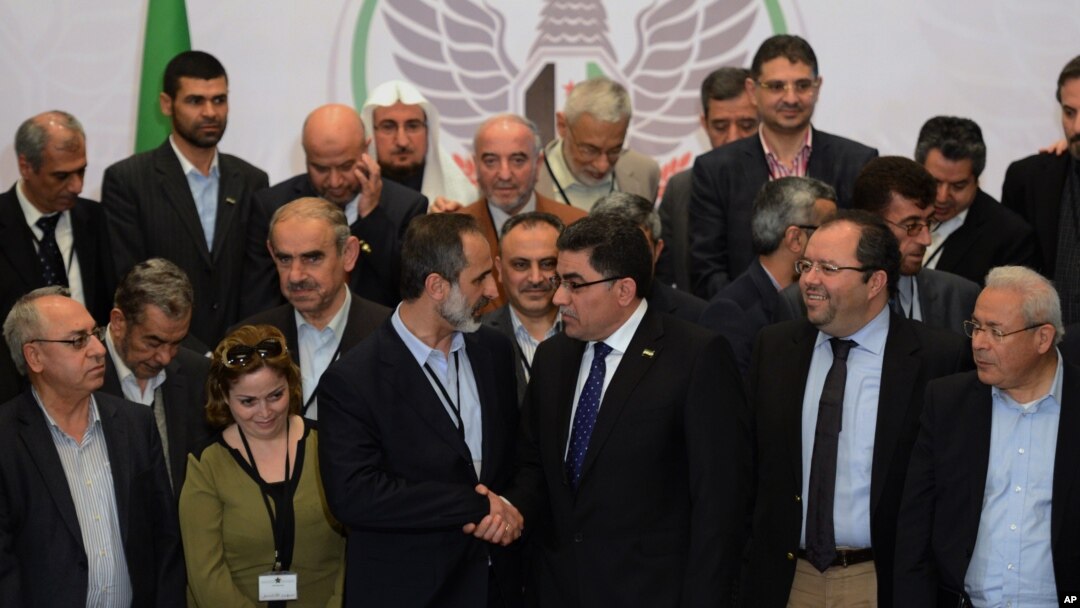The newly elected leader of Syria’s political opposition is a naturalized U.S. citizen who gave up a career in business and Internet technology in Texas to join an uprising to oust President Bashar al-Assad from power in Damascus.
Ghassan Hitto, 50, moved to Turkey last year. When the National Coalition of Syrian Revolutionary and Opposition Forces was created five months ago in Doha, he joined forces with democracy advocate and coalition co-chair, Suhair Atassi, who presides over the Coalition’s Aid Coordination Unit (ACU).
Together, they pushed for coordinated delivery of humanitarian aid from the United States and other members of the Friends of the People of Syria group to thousands of Syrians in rebel-held areas.
Hitto was narrowly elected interim prime minister with 35 votes in the Coalition’s general assembly late Monday. His nearest competitor was a former Syrian minister of agriculture who got 32 votes.
The opposition Coalition charged him to set up a provisional government inside Syria even as the battles with government forces grow more violent by the day. After being elected, Hitto ruled out any negotiations with the Assad government in Damascus.
Hitto is expected to appoint a cabinet – subject to the approval of the Coalition – for a provisional government that will extend emergency relief services and financial support to civic councils that have sprung up in rebel-held communities. The first priorities are to restore electricity, water, sanitation services and basic police and court systems.
How Hitto became prime minister
Hitto grew up in Damascus and moved to the United States to attend college. He is of Kurdish descent. His 25-year-old son, Obaida, left the family home last June to join Syria’s revolution and produce videos and photographs for opposition media services during fierce fighting in the eastern city of Deir Azzour.
“Obaida, bless his heart, made up his mind,” Hitto told the New York Times in October. A short time later, he decided to join his son in working for the Syrian opposition.
In Turkey, where the Syrian opposition has based much of its field and administrative operations, the senior Hitto gained respect among anti-Assad officials for facilitating a Joint Rapid Assessment in North Syria survey with the U.S. Office of Disaster Assistance, the United Kingdom’s Department of International Development and others.
The assessment revealed far greater assistance needs than the U.N. expected. Hitto’s agency identified more than 3.4 million Syrians in dire need of assistance in parts of the six northern and eastern provinces.
Hitto’s unit has worked closely with the U.S. government and its several non-government humanitarian services contractors to meet needs in Syria’s rebel-held areas. The Aid Coordination Unit is expected to help allocate future funding, including $63 million in U.S. assistance expected to arrive shortly.
The Assad regime and his forces, they have been bombing the infrastructure with intentSyria interim prime minister, Ghassan Hitto
Estimating the need, blaming Assad
In a recent interview with Voice of America, Hitto spoke of humanitarian needs on both sides of the war. He blamed the Assad government, however, for causing most of the suffering.
"The Assad regime and his forces, they have been bombing the infrastructure with intent” and are “destroying power, water, sanitation, refuse collection and public health services “in any of the cities that are under attack,” Hitto said.
“We are coming into a summer now where there are cities that have been filled with trash …,” he said. “We are concerned about diseases being spread in the coming months …”
Hitto also cited a U.N. estimate that just over 10 percent of the humanitarian needs in Syria are being met.
“I think to cover one year of basic relief and basic necessities, we’re talking about three to five billion dollars.”
Pushing the Security Council
“The issue is there isn’t enough aid to make the impact we would all like to see,” Hitto said. “Right now the amount of aid that is going to the Syrian people doesn’t satisfy the current need of the Syrian people. It doesn’t even come close.”
The United Nations is hampered in its aid projects, Hitto said, because it can operate only in areas under government control.
I think to cover one year of basic relief and basic necessities, we’re talking about three to five billion dollarsSyria interim prime minister, Ghassan Hitto
“I don’t know if permission from Bashar al-Assad is required here,” he said, but “whether Bashar al-Assad agrees to the cross-border operations or not, you are looking at half of the population of the north that needs aid and this aid is not coming through.
“And we are not going to wait, the war will not wait until Bashar Al-Assad says it’s okay,” Hitto said.
The latest images from Syria


